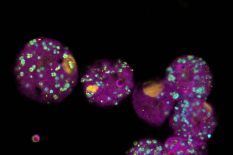New paper in PNAS: defensive symbiosis against giant viruses

Protists are important regulators of microbial communities and key components in food webs. Their activity is shaped by diverse intracellular parasites, including bacterial symbionts and viruses. In a study now published in PNAS, a team from the University of Vienna and the University of Poitiers around MAINTAIN members Patrick Arthofer and Matthias Horn investigated the role of bacterial symbionts of free-living amoebae in the establishment of infections with giant viruses.
They show that the bacterial symbiont represses the replication of Viennavirus in both recent environmental isolates as well as Acanthamoeba lab strains.In the presence of the symbiont viral factory maturation is inhibited, which leads to survival of the amoeba host. Furthermore, the symbiont also suppressed the replication of the more complex Acanthamoeba polyphaga mimivirus and Tupanvirus deep ocean.
This work provides the first example of an intracellular bacterial symbiont protecting a protist host against virus infections and the impact of virus-symbiont interactions on microbial population dynamics and eventually ecosystem processes requires further attention.
